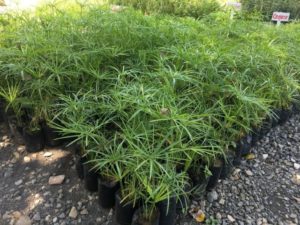
Our intention is to plant along the river because its purpose is for the prevention of soil erosion.
The skies were clear and there were no rains; and so it was a good time to plant that day.
Interestingly, the chosen variety: Umbrellas — a leaved plant, widely cultivated in water gardens, which grows naturally in the tropics.
The umbrella plants, numbering around 400, were planted by personnel of the Mandaue City Agriculture Office along the riverside of Butuanon River in Barangay Ibabao-Estancia as part of a pilot project.
Scientifically called Cyperus Alternifolius, the plant’s common name comes from the leaflets that grow on top of the tall stems which look like the spokes of an umbrella.
According to Mandaue City Agriculturist Sharon Mangadlao the grass-like plant, which thrives in aquatic areas, could grow up to two meters tall.
The plant has a strong root system that could hold up soil; while its components also help to decontaminate toxic chemicals that are discharged into the river.
“The umbrellas are quick to absorb toxic materials found in the river which, we all know, has become very polluted because of the discharges from different establishments,” said Mangadlao.
The idea to plant umbrellas along Butuanon River came from a study conducted by chemistry students of the University of San Carlos (USC).
Mandaue City has partnered with USC in a project to restore and rehabilitate Butuanon, a 24-kilometer highly contaminated body of water which borders along densely populated areas in the cities of Cebu and Mandaue.
“They have studies on umbrella plants in Budlaan (Cebu City) nga maoy kusog mosuyop og (that they were quick absorb) heavy metals. They suggested that it will be good for the Butuanon River,” said Architect Araceli Barlam, officer-in-charge of Mandaue’s City Environment and Natural Resoures Office (CENRO).
Barlam noted signs of sedimentation as wastes from companies and households located along Butuanon end up in the river.
“If the Butuanon River could speak about what’s going on, she would say nga gihugawan na siya pag maayo (she feels very dirty),” Barlam said.
According to Barlam, there are around 92 establishments in Mandaue City that dispose of their wastes directly into the river.
CENRO is coordinating with the Department of Environment and Natural Resources (DENR) to have the companies comply with government regulations on waste disposal, added Barlam.
“Our Butuanon river has become a canal,” Barlam lamented.
An umbrella plant scientifically named Cyperus alternifolius, can quickly absorb toxic materials in the waters where it is planted.
CDN photo/ Marc Cosep
River rehabilitation
Part of the project to rehabilitate tke Butuanon River involves the production of about 6, 000 umbrella plants for planting along a 1.6-kilometer stretch pilot area covering barangays Ibabao-Estancia, Alang-Alang and Paknaan.
The umbrella project began last October 3 and is targeted for completion by November.
Mangadlao highlights the importance of umbrella plants as a way to prevent soil erosion and landslides.
“Our intention is to plant along the river because its purpose is for the prevention of soil erosion,” said Mangadlao adding that aside from the river, the city’s agriculture office also planned to grow umbrella plants in areas at risk of landslides.
“Eventually, moabot gyod ta ana diha kay kahibalo man ta nga kon (we will get there because we know that when) there are landslide prone
areas, we will do something about it,” she assured.
Mandaue City Disaster Risk Reduction Management Offic (MCDRRMO) head Jay Basubas said that the recent massive landslide in Barangay Tinaan Naga City which claimed at least 78 lives and left around 7,000 people homeless was an “eye opener” for Mandaue City to conduct proactive measures.
Basubas said they are closely monitoring landslide prone areas in the city including barangays Cubacub, Casili and Tawason.
Mandaue City will host the 4th International River Summit next month, which will gather different stakeholders whose aim is to protect and rehabilitate all rivers in the country.
“Let’s help restore life through scientific and natural means. The umbrella plant is a start,” said Barlam.